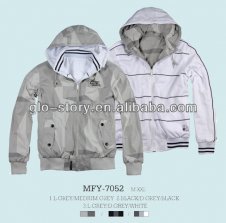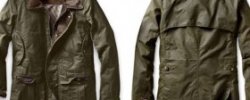| Back to Press Archive
American Apparel Takes on the T-Shirt Bobbin MagazineJulie McElwain Might 2001 With top-notch, fashion-forward shirts, American Apparel aspires to be the 'Starbucks' regarding the T-shirt world. When we think of the basic, blank T-shirt, they tend to think about big companies eg Hanes, Fruit of Loom, Russell and Anvil. However, improving as a T-shirt-wielding David among apparel business Goliaths, la, CA-based American Apparel is preparing to challenge that perception. Indeed, the organization really really wants to occupy similar marketplace space whilst the principal T-shirt people that offer their item into the imprintable market, explains Dov Charney, president and ceo. "Those businesses are huge. They carry enormous stock, and in the imprintable T-shirt business it's about having stock, being able to ship purchases on. But there's already been a shifting in this industry." Specifically, Charney says, the larger businesses have actually sent most of their manufacturing right down to Mexico or overseas. These types of changes have opened a window of chance for United states Apparel, which manufactures 95 per cent of its items domestically. "Our perspective usually while all of those other [companies] have moved their manufacturing offshore, we're devoted to becoming domestic, with a small percent slightly south associated with border, " describes Charney. Touting American Apparel's domestic manufacturing is much more than marketing, however. State-side production enables Charney to help keep close track of the standard of the range, that will be divided into exclusive label and its own companies. The second provides such labels as Classic Girl (a contemporary T-shirt line geared towards teenage women and women, and a newly established panty collection), Standard American (men's T-shirts) and Classic Baby (tiny shirts for infants and toddlers). Wholesale prices for the typical United states clothing T-shirt cover anything from $3 to $6, which Charney acknowledges tend to be somewhat more than the values of various other empty T-shirt organizations. "we are centered on high quality. We should become Starbucks — the premium T-shirt maker — the screenprinter, " says Charney. "no person needs Starbucks. Nobody gets the appetite to pay for three bucks due to their coffee. Many people just want the 60-cents cup. However some individuals desire the very best coffee, and will pay $3, $4 as well as $5 for this. We are finding the individuals who desire a better T-shirt." Charney has-been shopping for those people for longer than 10 years, since the time when he initially became enamored using the standard apparel product as a teen in Montreal, Canada. Tees from the usa, he believed, were exceptional in quality and offered a creamier hand, so he started trucking containers of blank shirts from their boarding college in Connecticut back to Canada. He along with his buddy — who had a company offering T-shirts at shows — would sell all of them from the streets. By the time Charney went to college the company had evolved beyond their group of friends. "I became attempting to sell to other screenprinters. The greater tees i purchased, the greater tees we sold, " he recalls. He quickly was looking to purchase T-shirts inside Carolinas, and from there it was a logical leap to manufacturing their own T-shirts underneath the American Apparel banner. "at that time, Hanes had been $30 for twelve, and you could make T-shirts for $22 to $23 several. I was thinking, 'Hey, that sounds like recommended.' That is how I jumped into production." During the early '90s, Charney put up store first-in Columbia, SC, then later on in Charleston, SC. For seven many years, the Montreal indigenous commissioned knitters and dyers, contracted cutters and sewers and tinkered with fit and styling to help make the perfect tee. Even though the knowledge ended up being educational, the time had been off from a small business point of view. "a was sort of collapsing truth be told there. All of the knitters and bigger businesses had been often going out of business or going their production overseas, " claims Charney. Having its contracting base drying up, American Apparel floundered. But during a sales visit to l . a ., Charney suddenly realized that southern Ca had its cottage business of T-shirt producers. The machine in the western Coast ended up being similar to that of the Carolinas, except the employees had less knowledge, around five to a decade versus 20, 30 and 40 years' experience from the east shore part. Charney made their move. The change through the Carolinas to Ca ended up being doable when Charney joined causes with Sam Lim, owner of a cutting and sewing center with another companion (who may have since left the organization). Charney and Lim merged their core operation in March 1998, although Lim has a cutting and sewing factory in Mexico (in which American clothing vessels 5 per cent of its manufacturing) and Charney has a distribution center in Montreal, which spearheads the business's exports into Canada. Initially, United states Apparel skewed greatly toward private label manufacturing, using its branded labels using a back-seat. Later on, Charney respected that "private label isn't lucrative long-term since your customer is often looking to make it cheaper. There's no commitment. They just want it less expensive, less expensive, cheaper. And there's plenty supply, from all corners of the world, it does not succeed possible to target because one location. So we de-emphasized exclusive label plans so we're focusing on our companies the imprintable T-shirt business that services the niche [screenprint] business, " he states. Charney can be determined to produce... |

|
Kixsports Primus Performance Soccer Ball (Size 5) Sports (Kixsports)
|







